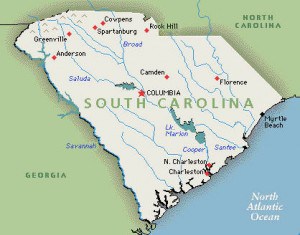 In the fall of 2009, South Carolina’s Budget and Control Board approved a fire-sale deal that leased out 95 percent of the state’s public wireless broadband spectrum to two private companies in a 30-year contract valued at $143 million, with the promise South Carolina would enjoy better broadband as a result.
In the fall of 2009, South Carolina’s Budget and Control Board approved a fire-sale deal that leased out 95 percent of the state’s public wireless broadband spectrum to two private companies in a 30-year contract valued at $143 million, with the promise South Carolina would enjoy better broadband as a result.
Two years later, South Carolina’s broadband standing has been called “a Corridor of Shame” according to one provider that is trying to expand service while Clearwire and DigitalBridge — the contract winners, sit on their respective hands.
Both companies secured access to the statewide Educational Broadband Service spectrum they get to control with near-exclusivity for less than $5 million annually — around $1 a year for every South Carolinian that could eventually be served with improved broadband. But nobody is getting service from either provider, indefinitely.
Columbia’s Free-Times notes neither company has concrete plans to bring broadband to anyone in South Carolina. Clearwire, now in financial trouble, provides no service in the state and DigitalBridge refused to comment for the newspaper’s story. Free-Times reporter Corey Hutchins could not find anyone able to provide any definitive information about either company’s short or long-term plans to hold up their end of the bargain.
Khush Tata, chief information officer for the S.C. Technical College System suspects one might not even exist. So long as these two companies maintain a lock on the spectrum, nobody else can deliver the wireless service either.
“I haven’t seen any big cohesive strategy since [the leasing] at all,” Tata told the newspaper. “I think that it’s still based on market and business viability for each provider so they’re sort of on their own. Each provider, they invest based on their return on investment, which is good for their business, but as a state there isn’t any overall planning or approach — and I think the leasing of spectrum provided the largest overall strategy opportunity, which is a pity that it hasn’t panned out yet.”
Don’t tell that to industry-connected Connected Nation, whose South Carolina chapter claims the state is doing better than most providing broadband service. The group has published maps, based entirely on data provided by the state’s phone and cable companies, that suggest most residents not only get the service, but have a choice in providers.
“That’s just plain bull,” says Stop the Cap! reader Jeff Lodge, who lives outside of Columbia. Not only does the local cable company pass him by, but there is no DSL either. He relies on an unlimited wireless data plan from AT&T and does most of his web browsing during breaks at work.
“I live in a community of 22,000 people and only those along the main streets in this community have access to broadband,” he says. “The cable company doesn’t go far off the beaten path, and the here-and-there DSL some get is dreadful.”
Even Connect South Carolina acknowledges broadband speeds in the state are often woefully behind others in the region. Many well-populated census tracts have no wired broadband at all.
With the pervasive lack of broadband, incumbent providers have been heavily lobbying the state to keep others off their spartan turf — pushing for the same type of legislation effectively banning community broadband networks that North Carolina passed earlier this year.
“It’s Time Warner Cable and AT&T… again, that are behind most of this effort, and those two companies treat South Carolina like a forgotten bastard child now,” Lodge says. “Can you imagine the arrogance of big cable and phone companies to keep competition away even when they, themselves, won’t compete?”
One company trying to make a difference: GlobalCo and their partner On-Time-Communications. A review of the under-developed website of the latter suggests neither entity is well-positioned or backed to deliver broadband without significant financial assistance. But at least they recognize the problem.
“In South Carolina there’s 10 counties that made [the FCC’s report on broadband unavailability] and the majority of them come out of what’s commonly referred to as the ‘Corridor of Shame’,” Ronnie Wyche, GlobalCo’s vice president of sales told Free-Times.
None of this comes as a surprise to Brett Bursey, director of the South Carolina Progressive Network, who opposed the spectrum sell-off.
“The bargain basement lease of the nation’s only statewide broadband system was a theft from, and insult to, the taxpayers who built and own the system,” Bursey told the paper. “The system is not being developed by the companies who won the lease and the Legislature is ideologically opposed to public ownership.”


 Subscribe
Subscribe


Thank you Mr. Dampier for highlighting the woeful broadband coverage in South Carolina. It is a sad day when monopolies such as AT&T, Time Warner, Comcast, and Charter are allowed to put out putrid, dinosaur-era products, and then turn around and purchase our trifling South Carolina politicians and prevent desperately needed competition from coming in. For areas such as Laurens County where I live, municipal fiber is the only way home…period (by the way, DSL is STILL NOT broadband or high speed).
2012 will be the apocalypse for the republican and democratic parties if we all try and vote for indies or other parties.
time to vote all the corruption out and get people who know what compromise means
I wonder sometimes if politicians cook up these ideas to stir up big companies. They get hush money thrown at them, then quietly, the once great ideas are forgotten. The leaders should be deeply ashamed for letting this go.